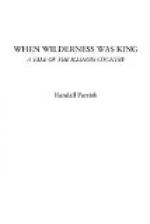“Then, for God’s sake, find some spot where I may rest for an hour,” he urged. “My brain seems reeling, and I fear it will give way it I remain in sight or sound of such horrors.”
In spite of all I had seen, it was still my desire to creep in among the deserted lodges while darkness shrouded the outermost of them; but I felt that some safe hiding-place must first be found for my companion. To attempt to take him with me while in such a nervous state would be only to invite disaster.
“De Croix,” I asked, “know you if the Indians have destroyed the house that stood by the fork of the north river, where the settler Ouilmette lived?”
“I marked it through Lieutenant Helm’s field-glass yesterday. ’T is partially burned, yet the walls still stand.”
“Then ’t will serve us most excellently to hide in, for there will be naught left within likely to attract marauders. Think you that you could find it through the night?”
He looked at me, and it was easy to see his nerves were on edge.
“Alone?” he gasped brokenly. “My God, no!”
There was seemingly no way out of it, for it would have been little short of murder to leave him alone on that black prairie, nor would harsh words have greatly mended matters. We were fully an hour at it, creeping cautiously along behind the scattered bushes until we passed the forks and swam the river’s northerly branch. The action did him good, and greatly helped to steady my own nerves, as the uproar of the savages died steadily away behind us.
At last we came out upon a slight knoll, and found ourselves close beside the low charred walls of what remained of Ouilmette’s log-cabin. ’T was a most gloomy and desolate spot, but quiet enough, with never the rustle of a leaf to awake the night, or startle us.
“Have you got back your nerve, Monsieur?” I asked, as we paused before the dark outline, “or must I also help you to explore within?”
“’T is not shadows that terrify me,” he answered, no doubt thoroughly ashamed of his weakness, and eager to make amends; “nor is it likely that anything to affright me greatly is behind these walls.”
I lay prone in the grass at the corner of the cabin, my eyes fixed upon the distant Indian village, where I could yet plainly distinguish numberless black figures dodging about between me and the flames; while further to the east, the greater blaze of the Fort buildings lighted up, in a wide arc, the deserted prairie. I gave little consideration to De Croix’s exploit,—indeed, I had almost forgotten it, when suddenly the fellow sprang backward out of the open door, a cry of wild terror upon his lips, and his hands outstretched as it to ward off some unearthly vision.
“Mon Dieu!” he sobbed hoarsely, falling upon his knees. “’T was the face of Marie!”
CHAPTER XXVIII
AN ANGEL IN THE WILDERNESS




